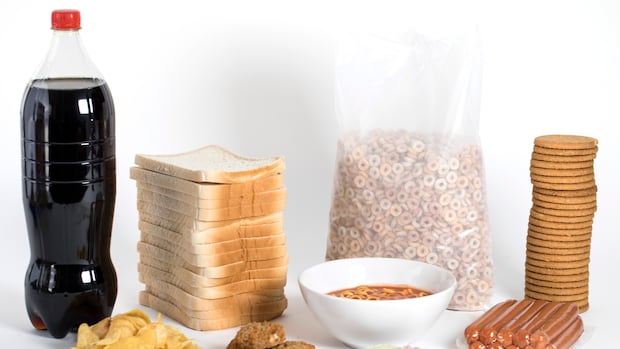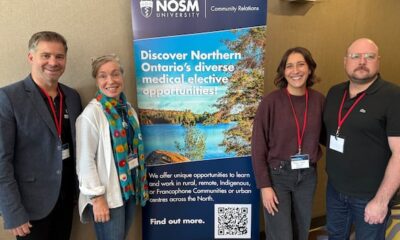Health
Ultra-Processed Foods Linked to Rising Health Risks in Canada

A recent study has identified ultra-processed foods as a significant health risk, particularly in Canada, where they comprise nearly half of the average diet. Medical researchers have pointed to these foods as a potential factor in the alarming rise of colorectal cancer among young adults. This finding adds to existing research linking ultra-processed food consumption to obesity, Type 2 diabetes, and heart disease.
Dr. Andrew Chan, a gastroenterologist at the Mass General Brigham Cancer Institute, emphasized the negative impact of ultra-processed foods on gut health. “We do think that there might be a role that ultra-processed food plays in really making the gut less healthy than it could be,” he stated. The study highlights the importance of dietary choices, noting that a high intake of ultra-processed items, often consumed away from home, can negatively affect overall health.
What Are Ultra-Processed Foods?
Ultra-processed foods are characterized by their extensive processing and the addition of various ingredients. Common examples include mass-produced bread, sugary cereals, instant soups, frozen meals, and processed meats like hot dogs and cold cuts, which often contain high levels of salt, preservatives, and additives. Other products in this category include sauces, condiments, sugary beverages, and pre-packaged snacks.
The ingredients in ultra-processed foods typically consist of fats, starches, added sugars, and hydrogenated fats. These items are designed for convenience and long shelf life but generally lack essential nutrients. Dr. Shady Ashamalla, a surgical oncologist at Sunnybrook’s Odette Cancer Centre, pointed out that these foods are also low in fiber and may contain artificial sweeteners and other additives, such as artificial colors and flavors.
Classification and Health Implications
Foods are classified in various ways, including the Nova food classification system, developed by researchers at the University of Sao Paulo in 2009. This system categorizes foods based on their level of processing, ranging from unprocessed or natural foods to ultra-processed items. For instance, freshly baked bread and salted nuts are considered processed, while foods like frozen dinners fall under the ultra-processed category.
Research indicates that foods with long ingredient lists often have lower nutritional value and higher health risks. While some processed items, such as certain yogurts and high-fiber cereals, may not fit neatly into this classification, the general consensus is that less processed options are preferable for overall health.
Reducing the consumption of ultra-processed foods can lead to significant health benefits. Dr. Ashamalla noted the correlation between diet and socioeconomic status, emphasizing that the convenience of ultra-processed foods often leads to higher consumption rates. To combat this trend, health professionals recommend incorporating more fresh or flash-frozen ingredients into meals and preparing food at home whenever possible.
Unprocessed or minimally processed foods, such as vegetables, grains, legumes, fruits, nuts, meats, seafood, herbs, spices, garlic, eggs, and milk, should form the foundation of a balanced diet. The Heart & Stroke Foundation advocates for making these whole foods the primary focus of dietary choices, promoting better health outcomes.
As the consumption of ultra-processed foods continues to rise, understanding their impact on health becomes increasingly critical. The findings from this study underscore the need for individuals to evaluate their dietary habits and consider healthier alternatives to improve their well-being and reduce the risk of serious health conditions.
-

 Politics1 week ago
Politics1 week agoSecwepemc First Nation Seeks Aboriginal Title Over Kamloops Area
-

 World4 months ago
World4 months agoScientists Unearth Ancient Antarctic Ice to Unlock Climate Secrets
-

 Entertainment4 months ago
Entertainment4 months agoTrump and McCormick to Announce $70 Billion Energy Investments
-

 Lifestyle4 months ago
Lifestyle4 months agoTransLink Launches Food Truck Program to Boost Revenue in Vancouver
-

 Science4 months ago
Science4 months agoFour Astronauts Return to Earth After International Space Station Mission
-

 Technology3 months ago
Technology3 months agoApple Notes Enhances Functionality with Markdown Support in macOS 26
-

 Top Stories1 month ago
Top Stories1 month agoUrgent Update: Fatal Crash on Highway 99 Claims Life of Pitt Meadows Man
-

 Sports4 months ago
Sports4 months agoSearch Underway for Missing Hunter Amid Hokkaido Bear Emergency
-

 Politics3 months ago
Politics3 months agoUkrainian Tennis Star Elina Svitolina Faces Death Threats Online
-

 Politics4 months ago
Politics4 months agoCarney Engages First Nations Leaders at Development Law Summit
-

 Technology4 months ago
Technology4 months agoFrosthaven Launches Early Access on July 31, 2025
-

 Top Stories3 weeks ago
Top Stories3 weeks agoFamily Remembers Beverley Rowbotham 25 Years After Murder




















